According to biographer Dwayne Epstein, Lee Marvin made it possible for future action stars like Charles Bronson and Clint Eastwood to blast their way on to the screen. It was Marvin who brought the level of violence to a new and realistic level that had never been seen before. Think Vince Stone in “The Big Heat” when he tosses a hot pot of boiling coffee into Gloria Grahame’s face. Oh sure, there was screen violence before, Paul Muni machine gunning his way to the top of the crime world in “Scarface” and Cagney blasting his way through “The Public Enemy,” famously smashing a grapefruit in Mae Clark’s face. But Lee Marvin made it look real and dangerous, it was never fun.
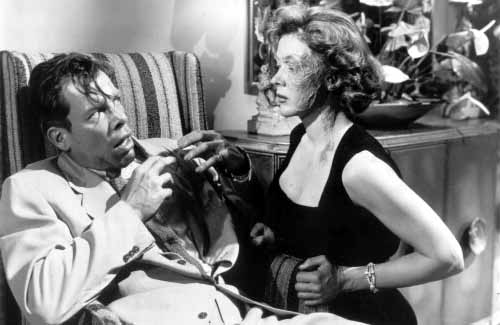 I recently had the opportunity via telephone to interview Mr. Epstein, author of the new Lee Marvin biography “Lee Marvin: Point Blank.” The interview was conducted on March 5th. As you read you will see Mr. Epstein is admittedly a big fan. That said the book is a well balanced look, both public and private, at the rugged actor and World War II Marine veteran. His filmography reads like a list of essentials. A partial list includes “Bad Day at Black Rock,” The Big Heat,” “The Wild One,” “Attack,” “Violent Saturday,” “The Man Who Shot Liberty Valance,” “The Killers,” “Cat Ballou,” “The Dirty Dozen,” “The Professionals,” “Point Blank” and “The Big Red One” among many others.
I recently had the opportunity via telephone to interview Mr. Epstein, author of the new Lee Marvin biography “Lee Marvin: Point Blank.” The interview was conducted on March 5th. As you read you will see Mr. Epstein is admittedly a big fan. That said the book is a well balanced look, both public and private, at the rugged actor and World War II Marine veteran. His filmography reads like a list of essentials. A partial list includes “Bad Day at Black Rock,” The Big Heat,” “The Wild One,” “Attack,” “Violent Saturday,” “The Man Who Shot Liberty Valance,” “The Killers,” “Cat Ballou,” “The Dirty Dozen,” “The Professionals,” “Point Blank” and “The Big Red One” among many others.
Below is part one of a two part interview.
Above: Author Dwayne Epstein
John: How did you become interested in Lee Marvin?
Dwayne: The short answer of course is I’m a fan and have been for a long time. The long answer is slightly more involved, and I won’t go into the details about it, but suffice to say that once I started dabbling into the research a least a little bit I became more and more intrigued and the more I find out the more intrigued I became, and that doesn’t happen very often where you find out about something the more interesting it is. In the case of Lee Marvin it certainly came to pass. Early on, I realized he wasn’t what he screen image or persona led me to believe he was, that’s one thing. Another was the fact that, as you do research on something, you discover, as you would with anything, certain running themes or links in people’s work, and somebody who had a career like Lee Marvin’s, long as he did, the theme and the link became very distinctive, and very strong. In doing the research I discovered he was a bit of a pioneer in the graphic depiction of violence in American cinema, in that it became very important to him to make it as realistic as you possibly can for film. I have some friends who are film historians and once I started doing the research I thought I’d go out on a limb and decide if I could actually make this statement and see if anyone could prove me wrong, that Marvin pretty much created the cinema of American violence. I have a friend, one of my best friends, a guy named Bill Krohn who is the American correspondent for “Cahiers Du Cinema” in France, so he knows he stuff when it comes to film history. I asked him, “has any other actor consistently portrayed graphic violence on film as much as Lee Marvin has?” After much consideration, Bill came back a couple of days later having checked it out and said, “No, just Lee Marvin.” And that kind of led me to wonder where that came from. Then the research got even more in depth when I started looking into his personal life and I discovered where that came from.
John: And that would probably go back to the time he spent in World War II?
Dwayne: Absolutely! Another thing I discovered, and once again I have to preface this by saying I am not an expert in the field at all, strictly as a researcher, I came to the conclusion that Lee Marvin had post traumatic stress disorder, quite clearly. By doing the research and looking into certain symptoms of post traumatic stress disorder, if there were ten of them, Lee probably had eight, if not all when they are kind of listed as to what they are. It was a direct result of World War II. Now prior to World War II, as a young man, he had run ins with authority figures, acts of violence and what have you and I make the point in the book, as you know, for literally purposes that he might have had that set in his path long before he was even born, based on his background, and his family history which is pretty impressive. But when it came to the war, what he experienced changed his life forever. In terms of certain symptoms of post traumatic stress disorder, alcoholism is one of the most prevalent, but alcoholism in and of itself isn’t enough, there were others. He publicly stated he suffered from survivor guilt being one of the few people of his platoon to survive the Battle of Saipan, he also had screaming nightmares. His first wife, his brother, his son, they all told me that he would wake up in the middle of the night screaming.
Dwayne: Yes, years later. Probably, the most specific symptom to post traumatic stress disorder was a story that was told to me by a friend of his in Woodstock, New York after the war, how he would seek out violence, he would look for it. He would make sure to put himself into situations where nobody could get hurt that badly. He would get into barroom fights and stuff like that just because he had been trained to kill and he could not get rid of that need to kill. He had all these pent up emotions and energies and what have you, and luckily he discovered the world of acting. He was able to channel a large amount of that behavior into his acting, not all.
John: But the films became kind of a release.
Dwayne: Right, on one level it definitely was. It was absolutely a release from the emotions and the feelings that he had, but also too it became something he felt necessary to tell the world at large, violence in movies is not fun, he would say this specifically. It’s not like a John Wayne movie where two guys get in a bar brawl and beat each other up, one guy get a little trickle of blood in the corner of his mouth and they say, “alright, let’s go have a drink.” He always said that was phony, it did a disservice and makes it unbelievable. He wanted to make it as real as he possibly can. But it’s interesting that he would say that because he did a couple of those films himself.
John: As does the films of today, they’re overly violent to the point where they are ridiculous.
Dwayne: Yes, it has gone to the other extreme where there are video games and what have that they are cartoonish. I’m sure there are people out there who really think that you can out run a fireball. It just physical impossibilities, they’re theme park rides, unrealistic cartoons.
John: Yes, and that’s exactly what we have today.
Dwayne: Yes, sadly.
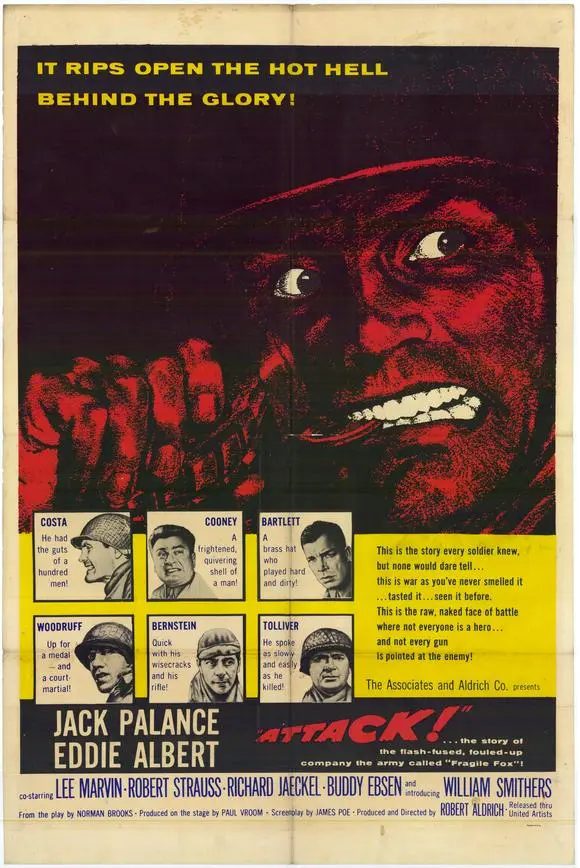 John: I have been watching some of his films recently, and what stands out is that the violence is real. It feels real.
John: I have been watching some of his films recently, and what stands out is that the violence is real. It feels real.
Dwayne: That’s right, as real as you could possibly make it in a movie.
John: His family history is kind of interesting. He had quite a few historical figures in his background.
Dwayne: Yes, he did. The earliest Marvin to come to America was his ancestor Matthew Marvin who helped settle the state of Connecticut. He was also, I believe the first state Supreme Court justice in the state of Connecticut. He was also a Puritan who made sure the farmers didn’t hang out in the bars and pubs and chased them to church, fun things like that. But more famously he was related to George Washington and Robert E. Lee, and I mention in the book his great uncle who helped raise Lee Marvin’s father was Ross Marvin who lost his life in the attempt by Admiral Peary to reach the North Pole at the turn of the century.
John: He was obviously proud of that background.
Dwayne: yeah, according to Lee’s brother, Robert, who I got to know very, very well.
John: Oh, you talked to his brother?
Dwayne: Yes, at length, I spent a couple of weeks with him. He was still living in the family home in Woodstock, New York. One of the things I discovered, it took a while to convince him, but he opened up the family archives to me and he told me that his father, Monty was very proud of Ross Marvin’s achievement, and also too that he kept a scrapbook of all the newspaper clippings involving Ross Marvin at the turn of the century, including when Monty was ten or eleven years old, when he started the scrapbook and that included stuff that neither Lee or Robert never knew anything about such as the fact that Ross Marvin didn’t die accidently, he was murdered…and Robert never knew that. I ask Robert if Lee knew that, and Robert said that if he didn’t know it, Lee definitely did not know it. Now he said that when they were kids, their father would tell them wonderful stories about their great uncle Ross, turning him into a hero of sort, which indeed he was, to a certain extent, but they never knew the real story.
John: As far as his drinking, it rarely got in the way of his work, right?
Dwayne: It rarely did, and once again, I ‘m not an expert, but from what I understand, when it comes to alcoholics the last thing to suffer is their work. They always seem to manage to get through the day and work, but what would suffers is their health, their personal relationships and what have you and when they are at the absolute end of being able to deal with it that’s when the work would begin to suffer. On occasion, it would with him. There were times he would drink too much, and that’s another thing, in the way the war affected him, it was a result of the PSTD. If he had to stand around and wait too long for somebody to get their lines right, friends told me, that he would have anxiety attacks. He would be pacing around, he would chain smoke and then he would lose it, he would say, “you know what, I’m coming back when you guys got this figured out. And he would go out and get drunk.
John: He always knew his dialogue, he was always prepared.
Dwayne: He was amazing that way. People would tell stories to me about this amazing facility he had for recuperation the next day no matter how much he had gone out partying the night before. He’d be up till three o’clock in the morning getting drunk and then be on the set and ready at seven o’clock the next morning. Just incredible. I think that must have been part of his marine training (laughs).
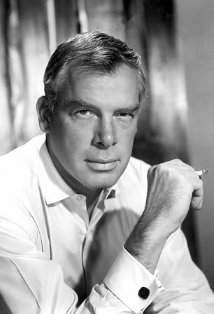 John: How did he get into acting?
John: How did he get into acting?
Dwayne: That’s in the book, it was a kind of roundabout way. The thing about Lee Marvin when you start researching about a guy like that he had a tendency to make up stories about himself because it was fun to do, he was a great story teller and some people went with it. A lot of the stories weren’t true and I had to use a lot of my own critical thinking skills to disseminate fact from fiction and often and luckily I was helped along by people who were there. He would often tell the story that when he was working as a plumber’s apprentice in Woodstock, that he was invited, well not invited, he was told to go to the Maverick Theater in Woodstock, New York and unplug a stuffed up toilet, and while he was there he saw them rehearsing a play. He also saw a tall pretty redhead that he had the hots for and while he was staring at her the manager came up to him and asked him if he would like to be in the play. He said, yes and the next thing you know he was an actor. Now the thing that makes that story questionable is the fact the Maverick Theater had no toilet!
(Laughter)
Dwayne: Aside from that, it’s pretty much the same story. He was at a party for a friend of his named David Ballantine, now David Ballantine, who I interviewed and he’s still around, is the brother of Ian Ballantine who started Ballantine Books.
John: Yes, I remember Ballantine Books!
Dwayne: There father was a gentlemen named E.J. Ballantine who was one of the producers at the Maverick Theater. Lee liked E.J. Ballantine because he was a drinking buddy of John Barrymore and Eugene O’Neill, the Provincetown Players in Massachusetts; he was a member of that. At this party everybody was getting drunk and having a good time. It was David Ballantine’s twenty-first birthday party, I think, and that’s when E.J. Ballantine told somebody else that the actor for this play, the play was called “Roadside,” the actor who was going to play a tall loud mouth Texan got sick and they needed someone to take his place. E. J. Ballantine shouted across the room, “We’ve got a loudmouth, right here, hey Lee can you play a loudmouth?” And Lee was like, “Sure, why not!” And the next morning he had to learn the lines, and I think it was like the next evening was opening night. So he barely learned the lines, but from all those who were in attendance, that I interviewed, said that he blew them away, that his presence on stage was incredible. He always said too that that hooked him. The moment he got on stage and he felt the power of what he could do on stage and the way he could channel his energy, he said, that was it for him. He decided that’s what he would do with his life.
John: One of the things I notice when watching his movies that whenever he is on the screen he does seem to blow everyone else away. It doesn’t matter whether the part was small or big.
Dwayne: Yep! One of the people I was just telling you about this lady, Betty Ballantine, who is Ian Ballantine’s widow. She became very good friends with Lee after the war in Woodstock and she told me even before he became an actor, she had known him, he had moved after the war to Woodstock with his family, and she said, “Lee was one of those people who when they walked into the room, you damn well noticed him.” He just owned the room. He had one of those larger than life personalities and he had presence. There was that incredible voice of his that just resonated. He was a great storyteller, he had a wonderful sense of humor, so if he could channel that ability into a performance, then you have a successful actor.
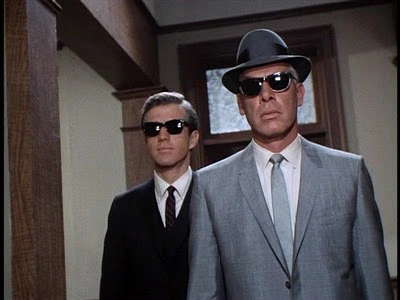 John: I was watching “The Killers” the other day and he is only in the film for about half the storyline
John: I was watching “The Killers” the other day and he is only in the film for about half the storyline
Dwayne: That’s true.
John: But whenever he’s on you just cannot take your eyes off him!
Dwayne: Yeah, I agree and there’s an interesting thing about that movie. I interviewed several of his co-stars, but one of them Clu Gulager who he’s in most of his scenes with and he told me that Don Siegel, the director, purposely told Clu Gulager to do all these little bits of business while they are on the screen together, purposely to make it competitive between them. Clu Gulager would be playing with his glasses and he was playing with a toy car during the dialogue and Marvin knew that he was gonna do that, and Marvin’s reaction would make it kind of competitive in the scene. Who was going to get the attention of the audience. Marvin’s reaction was, “do what you need kid, I’ll make sure people watch me.” And when you watch the movie, no matter what Clu Gulager does that’s exactly what Marvin gets, he robs his thunder, just being Lee Marvin.
John: That’s what I found amazing too. In his early films, in the fifties, he had small parts in films like “The Big Heat,” “The Wild One” and “Bad Day at Black Rock,” yet the characters he played are pretty much iconic now.
Dwayne: Absolutely, it’s amazing to me! How many actors could steal a film from a young Marlon Brando? You know, in “The Big Heat,” I don’t know if that’s one of the ones you were referring to being iconic…
Dwayne: The thing about “The Big Heat,” unlike other actors who have done similar shocking things in films before him like say James Cagney with the grapefruit in “Public Enemy” or Clark Gable slapping Norma Shearer in a film called “A Free Soul” that made Clark Gable a star. When Lee Marvin did what he did, it was anything but fun. There was always a sense of the audience getting their vicarious thrills when Cagney of Gable did it, but when Marvin did it in “The Big Heat,” he was branded The Merchant of Menace by New York Times film critic Vincent Canby. It kind of solidified him as a bad guy for over a decade. It wasn’t fun when he did it.
John: It doesn’t look like it.
Dwayne: I just loved the way they played that too, because it was the fifties, they couldn’t show it actually happening, there was a cutaway, but the way his voice rises when he is screaming at her, and then they show the coffee being grabbed, then they stay on the coffee heater and you here her scream, you know what happened, just because of the way he plays it, not her.
John: My own first memories of Lee Marvin are as a young kid watching “M Squad” on TV.
Dwayne: ” Oh yeah, absolutely. That was very important to his career because it established his name and his face to a wider audience. He personally didn’t like doing the show, he couldn’t stand it.
John: He didn’t like working on TV?
Dwayne: No, not at all, especially a series. He did a lot of television during his career. The medium itself he didn’t care for because he felt it was geared toward commercialism and selling a pack of cigarettes. He also didn’t like the rushed schedule of it and he thought the output of it was rather mediocre, yet ironically, I happen to think, some of his most versatile performances were on television. He did some amazing things on TV that he was never allowed to do in film because he kind of got pigeon holed or typecast a certain way. As far as “M Squad” goes there are certain aspects of the show that I like because it has a kind of real fifties, gritty noir feel to it. I also like the look of his character. He purposely cut his hair real short so it had that kind of steal gray bristle cut, and the short flat fedora and the .38 snub nose. He was cool.
John: It was fifties cool!
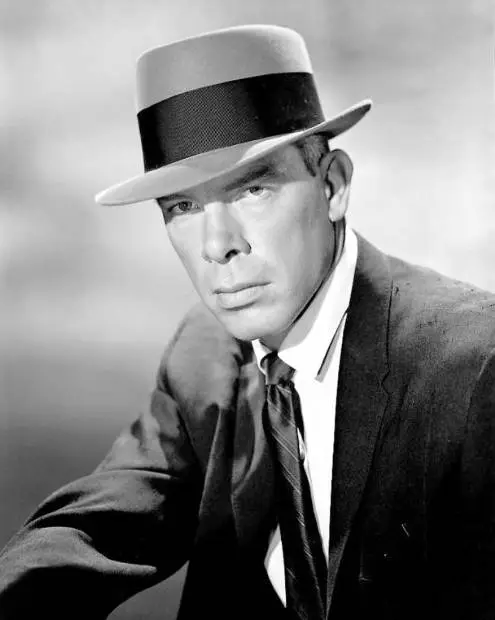 Dwayne: Exactly, and being a show from the fifties there were a lot of future superstars on that show. Angie Dickinson was on an episode of that show who he worked with a lot later, so was Charles Bronson, Burt Reynolds, Leonard Nimoy. That kind of stuff is always fun to watch.
Dwayne: Exactly, and being a show from the fifties there were a lot of future superstars on that show. Angie Dickinson was on an episode of that show who he worked with a lot later, so was Charles Bronson, Burt Reynolds, Leonard Nimoy. That kind of stuff is always fun to watch.
John: I just picked up the box set, I got a real good deal on it, but I haven’t watched anything on it yet.
Dwayne: On, very cool, excellent. Oh, I love that opening by the way. That’s so cool, the way he just gets out of his car and randomly shoots at whatever happens to be just passing by. I don’t know whether you know this or not, but that show was the basis of “The Naked Gun,” you know the Police Squad movies.
John: Oh really, I didn’t know that.
Dwayne: Yeah, the character Leslie Neilson plays, he wasn’t picked by accident, with the white hair he bore a slight resemblance to Lee Marvin. Lt. Frank Drebin instead of Lt. Frank Ballinger.
John: He worked with some notable directors during his career, Aldrich, Frankenheimer, Fuller and of course John Ford. How did he get along with John Ford who was known for being cantankerous?
Dwayne: He got along wonderfully with John Ford, mainly because he loved him. As you know, Ford had a legendary reputation for being rather cantankerous, and the thing about John Ford, from what I understand, on a given film, that after a time, in every movie, he would pick one actor and put him in the barrel, as they said, which meant that actor would be picked on non-stop by Ford, unrelentingly. Some actors could take it and some actors couldn’t. During the making of “Liberty Valance,” it was Jimmy Stewart. He put Jimmy Stewart in the barrel as it were. Now, that was the first time Marvin worked with John Ford and Marvin was very good at kind of manipulating his directors, kind of mind messing with them, for lack of a better way if saying it. The first time he met John Ford, he stood up, he blew a Bosun’s whistle, he knew Ford had been in the Navy, and Ford said, “What the hell are you doin’ kid?” Lee Marvin said, “Well, when the Admiral comes aboard, you pipe him in.” And Ford liked that because it was Marvin’s way of saying he can dish it out as well as take it. L.Q. Jones, the character actor told me he visited the set one day, he was good friends with Strother Martin who was also in the movie, and he said he witnessed John Ford say to Lee Marvin something that he never ,ever said to anyone, John Wayne, Henry Fonda, Harry Carey, it didn’t matter. When he called Lee Marvin to the set for that famous scene in the restaurant, the way he called him to the set, he shouted through the megaphone, “Lee, take the stage!” L.Q. Jones said, “that may not mean much to you, but as a professional actor to hear John Ford say that to anybody, that’s gold!”
Dwayne: So yeah, they got along very good because, like I said, Marvin could dish it out as much as he took it.
John: In the back of the book you have a series of list and one is a list of film projects that Lee either considered and for one reason or another he turned down or the film just never got made. One of the films on the list I found really interesting, that is, he considered doing was “The Wild Bunch,” and I assume it was the role of Pike, played by William Holden.
Dwayne: Absolutely.
John: He would have been fantastic for that role. In reading the book, I’m not sure it ever answered the question what happened?
Dwayne: When a book gets written sometimes thing get edited out for space or what have you. As far as “Patton” (another film on this list) goes his agent, Meyer Mishkin, his career long agent, told me he turned down “Patton” and it was turned down by a lot of people before it got to George C. Scott including John Wayne, Burt Lancaster, Rod Steiger. Marvin turned it down for a specific reason. He said, “How can I play a guy I couldn’t stand,” which I thought was a pretty cool attitude to take. He knew of Patton and he didn’t like him. As far as “The Wild Bunch” goes, I think if it’s possible for Lee Marvin to have one major regret in his career, it’s the fact that he didn’t get to make “The Wild Bunch.” Now a lot of people don’t know this, but he was involved in the beginning of that project when it was still in its embryonic stages. He helped the screenwriters develop the whole story. He was also the person who introduced the property to Sam Peckinpah, so he was in it from the get go and he wanted to play that part very badly. But, at the time he was possibly going to do it, his agent Meyer Mishkin told him, “you know, you made too many violent films in a row, at this point, “you might want to do something different, they’re looking at making a film version of the musical, ‘Paint Your Wagon’ and that would be a good change of pace for your career.” When Marvin read the script to “Paint Your Wagon,” keep in mind that the script he read was originally written by Paddy Chayefsky, who is no slouch as a writer. What Marvin read was wonderful to him, parts of which are still in the finished film, he loved it and said the part fit him like a glove. Now, he was in New York at the time and the casting meeting for “The Wild Bunch” was in California. He told Meyer Mishkin, he had his permission to turn down “The Wild Bunch” if he deemed it necessary and that is what Meyer Mishkin did.
John: Ouch!
Dwayne: Yeah.
John: Nothing against William Holden but Lee Marvin would have been perfect for that role.
Dwayne: You know what’s interesting too, in the movie, “The Professionals,” you see the way he played the character, that’s exactly the way he would have played Pike Bishop too, the look, the attitude, everything.
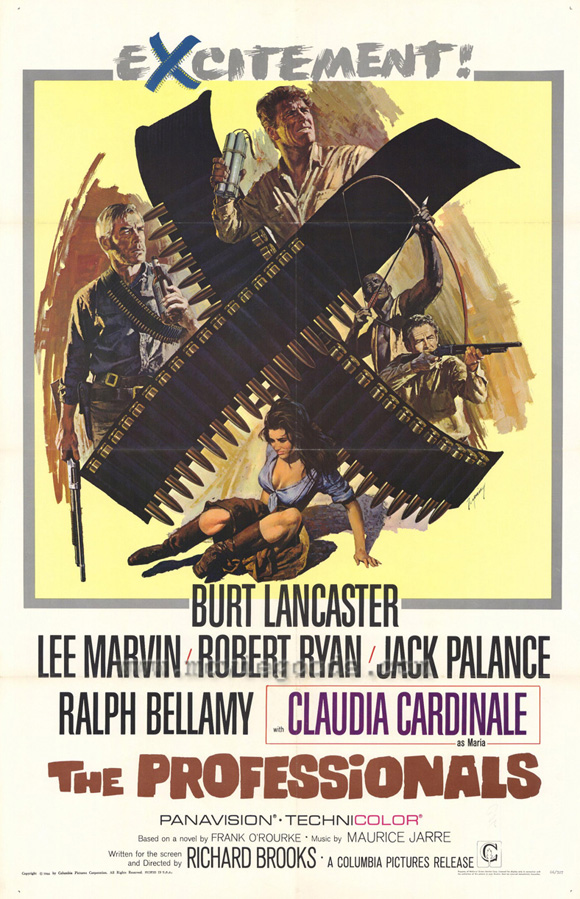 John: Now that you mentioned “The Professionals,” I believe Burt Lancaster was top billed yet the film seems to circle around Lee’s character and there seemed to be good chemistry between them, but off screen that wasn’t really the case, right?
John: Now that you mentioned “The Professionals,” I believe Burt Lancaster was top billed yet the film seems to circle around Lee’s character and there seemed to be good chemistry between them, but off screen that wasn’t really the case, right?
Dwayne: You’re actually right about that see, Lee Marvin’s character is the leader of the professionals, but it you watch it, Lancaster actually had more screen time because of that extended sequence at the end of the film between Lancaster and Jack Palance. Lee Marvin is the head of the professionals and during the making of the film, it was his belief that his job was to be in support of Burt Lancaster as he had been throughout his career with other actors. He told other people that as well, “our job is to make Burt look good while we find our niche in this project.” I think the film is aptly named for a number of reasons aside from how well it was made. Also Lancaster and Marvin did not like each other. They didn’t get along because they were very different men, but you would never know that by watching the movie. They have a natural chemistry together, they look like they have been friends for decades and have gone through all kinds of adventures, but once the camera stopped rolling they went their separate ways. Part of it was based on both of them, at the time the film was made had a lot of other things going on that made it impossible to bond. Lancaster was dealing with the breakup of his marriage, so was Lee Marvin and that may be the kind of thing women may bond over, but guys of that generation didn’t. They’re not going to go out drinking together and say things like you’re going through and I’m going through this, at least not guys like that. So that was a factor. Now, they got along and there’s a great story that Lee Marvin told years later when he made “Cat Ballou” and he got the Oscar for it. Lancaster sent him a telegram saying, “Congratulations, welcome to the club.” Seven years later, I think this was 1972, Marvin read in the newspaper Lancaster got arrested for drunk driving in Malibu right where Marvin lived. He said he had to get to a telegraph office, send one off to Lancaster, saying “Congratulations, welcome to the club!”
John: You mentioned Jack Palance and I know that Lee and Palance made quite a few films together and I think they were friends.
Dwayne: Yeah they were, absolutely.
John: In those early films they made, Jack Palance was the star while in the later films it was Lee Marvin. Did that have any effect on their relationship?
Dwayne: Yes and no. They were the kind of guys that would joke about that kind of thing. Phil Parslow who was a producer on the film and also a production assistant on “The Professionals,” told me that it bothered Palance in the beginning that Lancaster and Marvin would show up in chauffeured driven Caddies and Palance would have to drive himself in a rented Mercury because he was lower in the cast list. As far as Phil Parslow was concerned, yes it bothered Palance, but he believed Palance got the last laugh because he thinks he stole the movie from the other actors. I don’t necessarily agree with that but Jack Palance certainly held his own very well. When you make the kind of pictures that Lee Marvin made you going to work with the same actors a lot, not that as an actor he had a stock company, that’s something reserved for directors who get to pick the cast, but he worked with Jack Palance a lot, Charles Bronson, Ernest Borgnine, Angie Dickinson . These were actors of a certain ilk, you know what I mean? They did certain kinds of films, so consequently they would zig and zag in and out of each other’s career a lot. I think the last time he and Palance worked together was “Monte Walsh” and I think their chemistry in that film was wonderful.
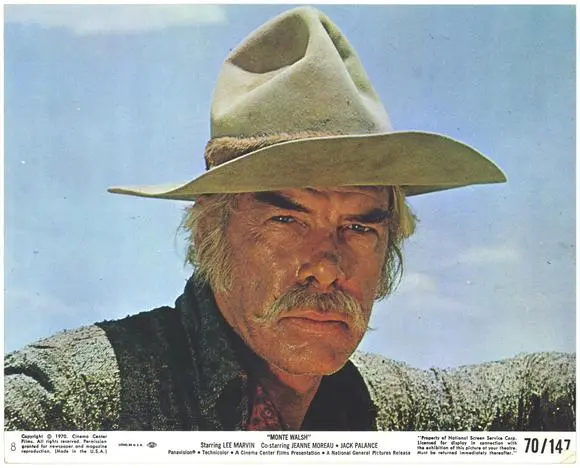 John: Oh Yeah! I watched that film about a month ago and it was terrific.
John: Oh Yeah! I watched that film about a month ago and it was terrific.
Dwayne: I love that film. I think it’s one of Marvin’s most underrated film’s and the relationship between Marvin and Palance in that film was hardly the best they ever had, in that, they’re pals and Palance plays a sympathetic character which you very rarely get to see him do.
John: Mentioning that film reminds me wasn’t that the only film where Lee had a love scene?
Dwayne: He had a love scene in “Point Blank,” but it’s not really a romance in “Point Blank” as much as it was a matter of convenience.
John: How did Jeanne Moreau get involved in the film?
Dwayne: She was Lee Marvin’s personal choice, The producers wanted Deborah Kerr at the time, but Marvin opted for Jeanne Moreau. He didn’t get official screen credit as a producer, but he pretty much worked as a producer on the film even though his sole credit was as an actor; he was very hands on. He and the director, William Fraker, made a special trip to Paris to try and convince Jeanne Moreau to play the part…and it worked, she did, and during the making of the film, and this is no secret, at the time it was, but Lee and Jeanne Moreau had an affair, their chemistry on film was real. He almost married her.
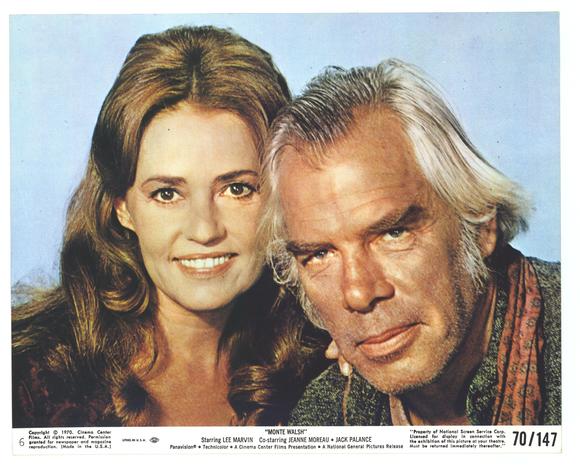 John: Really they would have been an interesting pair.
John: Really they would have been an interesting pair.
Dwayne: Mitch Ryan who was in the film too, he was wonderful, he played the character Shorty Austin. Mitch Ryan, who got to become very good friends with Lee, told me that, he asked Lee, “What happened between you and Jeanne Moreau?” Marvin told, “She wanted me to move to Paris. Can you see me living in Paris!”
John: So was it Lee who selected William Fraker as the director for Monte Walsh?
Dwayne: Yes, from what I understand. It was Fraker’s first film. He had worked with Fraker before because Fraker was the cinematographer on “The Professionals” and “Paint Your Wagon.” He like Fraker’s work and he wound up making his directorial debut with that film.
End of Part One
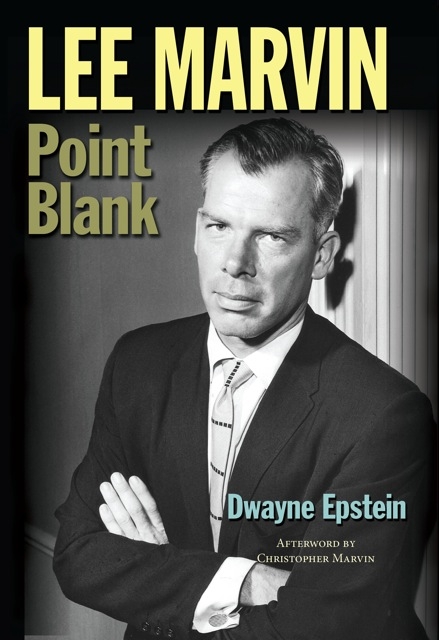
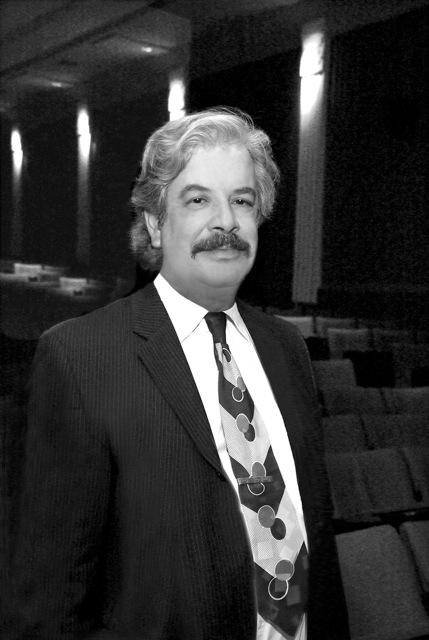
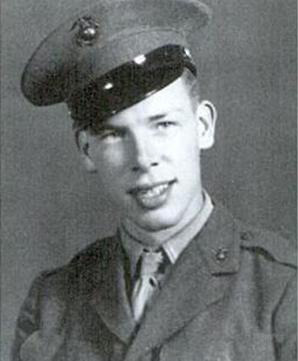
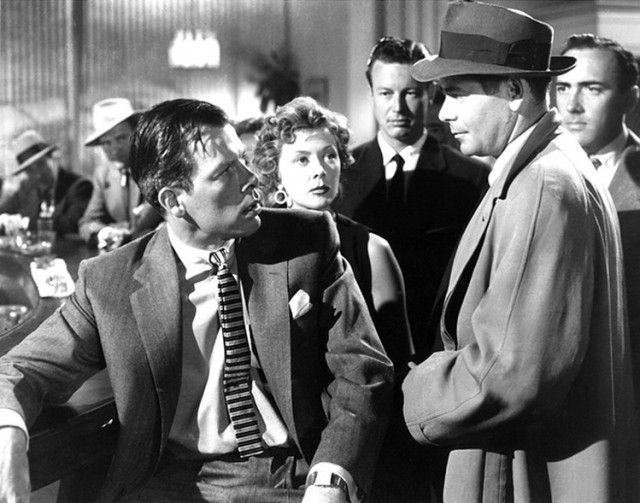
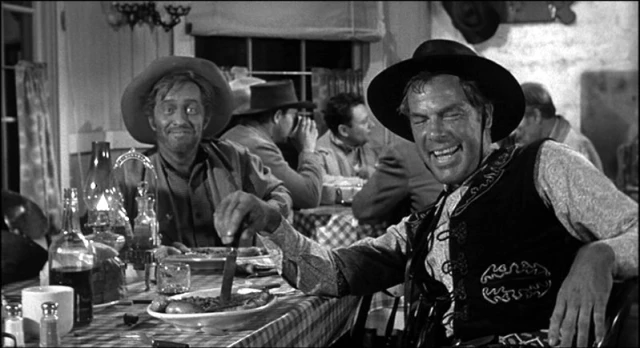
Great interview and a very interesting one. While not a bona fide Lee Marvin fan, I have seen The Dirty Dozen, Liberty Valance, The Big Heat, and recently Point Blank. He managed to make me feel sorry for his character in Point Blank, and I usually don’t feel too sorry for folks caught up in the underworld of crime.
LikeLike
That’s interesting Jennifer, that is, about you feeling sorry for his character. Well, you have seen some of his best films though, if I may, and if you have not seen them, check out BAD DAY AT BLACK ROCK, CAT BALLOU, THE PROFESSIOALS and MONTE WALSH.
LikeLike
What a tremendously interesting interview, John. You asked some great questions.
I have to admit, Lee Marvin is an actor who has rarely crossed my radar. I vividly remember him throwing the hot coffee into Gloria Grahame’s face in “The Big Heat,” and I know he was part of the hood crowd in “Bad Day at Black Rock,” a film which I watch for the amazing Robert Ryan. I saw “Liberty Valance” only once, several years ago, and I remember it so little that I couldn’t have told you Lee Marvin was in it. I’m pretty sure those are the only films of his I’ve seen.
“The Iceman Cometh” is on my must-watch list, as it is the final film of Robert Ryan (whom I adore!) and Fredric March (whom I greatly like). I have heard that Marvin’s performance in that film is extraordinary.
Anyhow, he sounds like a sensational actor, who really gave 100% to all his roles. I look forward to the 2nd part of your interview.
LikeLike
Patti, I have not seen THE ICEMAN COMETH either, but look forward to catching up with it. As for Robert Ryan, he is a great actor and has done some wonderful films, many of which I admire. Have you seen THE PROSFESSIONALS and THE DIRTY DOZEN? those are two other films with both Marvin and Robert Ryan. i only wish Lee had made THE WILD BUNCH.
LikeLike
John, a wonderful post with lots of great anecdotes and background about Marvin that was new to me. I always think of Marvin after he won the Oscar as sticking to the kind of tough, no-nonsense, but in some way noble characters that became his specialty. I’d forgotten about “Paint Your Wagon” (which I’ve not seen), which was a real change of pace for Marvin, and it was fascinating to read that he was talked by his agent into taking it specifically for this purpose. Maybe the failure of that film was one of the reasons he went back to his tried and true characters and stuck with them. Reading what a great effect WW II had on Marvin makes “The Big Red One,” a film I like very much (in its reconstructed version), all the more interesting.
LikeLike
Thanks R.D. – True about his agent recommending his taking PAINT YOUR WAGON as a change of pace but unfortunately, at least to me, he gave up on THE WILD BUNCH in exchange which would have been a perfect role for him. Nothing against William Holden who I like very much but it seems to me the role of Pike Bishop was just about made for Marvin. Have you seen MONTE WALSH? That film is a bit of a change for him more in the vein of Peckinpah’s THE BALLAD OF CABLE HOGUE. BTW – it’s going to be on TCM March 23rd at 3PM (Eastern). An underrated and forgotten gem from the early 70’s. THE BIG RED ONE is a terrific film. Sadly, I did not get a chance to discuss that one with Dwayne.
LikeLike
What a great interview about an one-of-a-kind actor. I can’t wait to read this one.
LikeLike
He was a war hero as well as great actor and his family tree has an interesting background.
LikeLike
Fantastic interview. The author sounds like quite a character himself! A lot of terrific stories here.
LikeLike
Thanks SS, it was a pleasure talking to Dwayne.
LikeLike
John,
You always manage to score such great interviews.
Thanks so much for sharing your conversation with Mr. Epstein. This was a real treat and it certainly has peaked my interest in his new bio on Mr. Marvin.
I’ve been wondering what to buy my dad for Father’s Day this year so this write up came just in time. My dad is one of the biggest Lee Marvin fans out there so I know he’ll really enjoy this book. Of course, I’ll need a copy for myself.
So glad that we have writers out there that are willing to put in the work and research it takes to give us old Hollywood fans new bios on our favorite stars.
Thanks again, John and Dwayne for the open and very informative interview.
All the best!
Page
LikeLike
Thanks Page for the kind words and glad to hear that your Dad is a major Lee Marvin fan! I am sure he will enjoy the book. As you and your Dad read the book you will come to realize what an amazing life Lee Marvin had, not only for his film work which is extentive, but his family history and his time as a marine during WW2.
LikeLike
John: Yet another in your long lines of fascinating interviews with film star authors. You are incomparable on this. The first part of the Lee Marvin interview is wholly fascinating I must say! There were a few revelations that were jaw-dropping, like the manor in which Ross Marvin died. And you are right that the star brought attention on himself in smaller roles like BAD DAY AT BLACK ROCK and THE BIG HEAT. The whole video games tie-in, the family history and Marvin’s good friendship with John Ford are all part of this interview’s great appeal. Enjoyed the discussion of MONTE WALSH and POINT BLACK of course. Ironically I did not think Marvin should have won the Oscar over Rod Steiger, but he certainly deserved more than won for his fantastic career.
Terrific interview! Look forward to Part 2!
LikeLike
Thanks Sam! Marvin’s family history is amazing! In addition to Ross Marvin there was family connections to both George Washington and Robert E. Lee who both Lee and his brother Robert were named after. Steiger deserved to win for THE PAWNBROKER, but as we both know the Academy has its own agenda at times.
LikeLike
Very interesting interview, John – must admit I grew up thinking of Marvin mainly as a singer, because my mother had the single of ‘Wand’rin’ Star’ and played it endlessly. His gravelly voice in that song is amazing, though I’m not a huge fan of ‘Paint Your Wagon’ as a whole – but anyway I’ve caught up with some of his other roles since, though I need to see more, and recently saw him in an interesting supporting role as an outlaw in Raoul Walsh’s ‘Gun Fury’.
LikeLike
Judy, I have to say you may be the only person who may have first come to Lee Marvin as a singer! GUN FURY is a decent western. If you have note seen BAD DAY AT ROCK ROCK, THE BIG HEAT, THE MAN WHO SHOT LIBERTY VALANCE these are some great early roles and the films are all excellent in general. Thanks as always!
LikeLike
I’m a big fan of ‘Liberty Valance’ but need to catch up with the others you mention here, John. Yeah, I suppose thinking of Lee Marvin as a singer may be like my daughter first seeing Bruce Willis in ‘Friends’, and saying after that whenever she saw him in something else “Oh no, it’s the guy who cried all the time in Friends’! She has since caught up with some of his more typical roles though…
LikeLike
[…] with Dwayne Epstein, author of the new biography Lee Marvin: Point Blank, just click right here and you would be directed right to it. The book is available at Barnes and […]
LikeLike
Great interview with Dwayne Epstein about Lee Marvin and his fascinating life. I thought he had amazing screen presence even when I was him in one of his early roles in THE CAINE MUTINY! I was particularly moved by Epstein’s account of Marvin’s war-induced PTSD. Can you imagine what it might have been like if Lee Marvin had actually settled down in Paris with Jeanne Moreau? 🙂 Looking forward to Part 2!
LikeLike
Thanks Dorian! Moreau and Lee would have made for an odd couple, It would have been fascinating to see!
LikeLike
[…] Tucson Monthly, MoMA, Twenty Four Frames, Análise […]
LikeLike